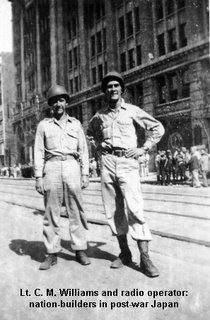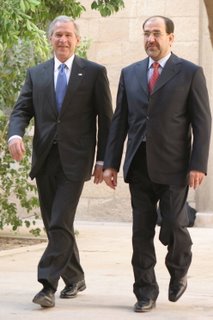C-SPAN is my favorite media outlet. You get to hear interesting people from all perspectives, and you get to hear from them in a complete setting rather than in mere sound bites.
Tonight C-SPAN ran a
panel from BookExpo America taped on May 20th. The panel was moderated by Lynn Sherr, and included Pat Buchanan, Arianna Huffington, Frank Rich, and Andrew Sullivan–all of whom have a new book out. Aside from the C-SPAN showing, there may be a
BookExpo podcast of the event available shortly.
I watched the almost 1-3/4 hour session with interest. Buchanan and Sullivan are from the right and Huffington and Rich are from the left. The main thing that united the four main speakers was a scathing critique of President Bush and his policies.
They were all animated by firm belief in principles and had strong, clear, competing critiques. Huffington and Sullivan hurt their cases by a sometimes slim grasp of Amerian history and politics.
Arianna Huffington blasted Democratic politicians who are afraid to stand up for their principles. Hillary Clinton was a major target.
(By the by, Al Gore, was a favored Huffington Democratic dark horse for 2008 as someone standing on principle unafraid and “willing to speak truth”. What is this Gore attraction? It was echoed by Thomas Friedman, in an interview last week on the Charlie Rose show. Friedman also found Gore attractive because he was eager to stand up and talk about “real” issues like global warming to anyone--groups of two or three or a thousand. Somehow Gore's willingness to talk anywhere or to anyone about the subject was admirable to Friedman. As someone who has sat next to people on airplanes willing to talk to anyone anywhere, I haven't found that a universally delightful quality.)
Huffington asked where were the politicians who stand on principle instead of being driven by fear of winning/losing “likely undecided voters”.
If I may be so bold as to answer her question, one sees them all around. They are the losers. Candidates like Dennis Kucinich and Pat Buchanan (in 1992 and 1996) in the mainstream parties. Then there's Ralph Nader and a host of third party candidates outside the mainstream parties. There’s a reason that politicians carefully watch what they say. No one has won the presidency who did not. No one. Poor Howard Dean even lost his chance by a stray scream.
This lack of understanding of what it takes to win the presidency or be politically effective nationally was echoed to a smaller extent by all the other panelists as they roundly criticized Congress, the Democrats and the press (only Andrew Sullivan standing up a little for the press) for not effectively criticizing Bush's disastrous policies.
Pat Buchanan’s new book is directed to discussing the danger to American society of not dealing with the immigration problem. He said he thought the Republicans would be better off if they lost the House in 2006 because in 2008 the people would have a clearer view of the difference between the two parties. He’s probably right, but isn't the more important question whether America would be better off if the Democrats gained control of the House?
Frank Rich’s new book is about the showmanship (bad sense) of the Bush administration. How Bush, Cheney, Rove, etc., are bad, bad, bad and have manipulated the American people, press and the Democrats.
Frank Rich did show the most common sense on the panel in answering what he thought would be Bush’s legacy. When Huffington and Sullivan gave harsh one-liners, Rich said we don’t know if President Bush has seen something we didn’t see. It was a refreshing, though brief, whiff of humility. Maybe Rich was thinking of the harsh criticism of President Truman during his time in office, or of President Reagan, and the growing rejection of that contemporary analysis as time goes by.
For me the most interesting critique was that by
Andrew Sullivan. First he said that doubt is central to the conservative view of religion and politics. In religion, Sullivan scored those who had the audacity to think that if God existed anyone could know Him or His thoughts.
Sullivan said the conservative approach to morals is “'What should I do?' not 'What should someone else do?'” He mentioned issues like stem cell research. But one wonders if Sullivan thinks God’s view of slavery or genocide is equally unclear. It’s easy to poke fun at smaller issues, but if the doubt point holds, it holds on major issues as well.
Later on in the discussion Sullivan mentioned federalism as the key to dealing with the US cultural divide on moral issues like marriage and abortion. He said Alabama can have a different view of marriage than Massachusetts. Perhaps on marriage that will work (though it didn’t work in the past with polygamy). Federalism didn’t work on slavery in the 19th century. It did not work on civil rights in the 20th century. Whether it will work on abortion is a real question. Abortion falls much closer to slavery than to the definition of marriage because it is a life and death/human rights issue.
Federalism is a wonderful mechanism to allow for diversity, but there are some types of diversity that a free society cannot accept and remain intact. I’m assuming that Andrew Sullivan knows something about American history, but he did not allow either the Civil War, the civil rights movement or polygamy to illuminate his thinking in this discussion.
Sullivan then moved to the doubt that is at the center of conservative view of government. He said since human intelligence is limited, we don’t see unintended consequences. Because of this it is best to have a limited government that only acts on essential issues. That makes practical sense.
However, it doesn’t sound like the
Declaration of Independence. The Fathers of our country thought that government should be limited because God had given every person unalienable rights–life, liberty and the pursuit of happiness being some of them. Actually, Sullivan quoted the “life, liberty and the pursuit of happiness” part of the Declaration in his talk. But, he put it in the context of saying that government is not to impose truth or morality. Instead it is to secure the right of each person to live his life freely and pursue his personal view of happiness. That may be a nice modern reading of the Declaration, but it doesn’t really catch the original spirit.
Actually, the signers of the Declaration said something quite different. The essential point was not the fallibility of man, but that God, the Creator, had given each person unalienable rights that no government had the right to take away. The Declaration was pretty “truth” and “morality” based. The signers thought they knew something about what God was for and against. Their support for taking an action which risked "our Lives, our Fortunes and our sacred Honor" was based on "a firm reliance on the protection of divine Providence".
Not modern. Not trendy. But the truths in the Declaration of Independence fueled sacrifice, a revolution, and a government which, with all its problems, is a fountain of blessing to its people and those who have copied it.







